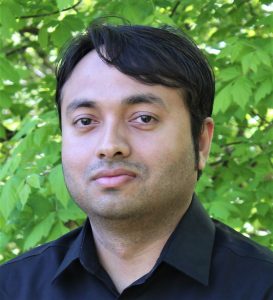
Prof. Soham Ghosh
Department: Chemical & Biological Engineering
University: Colorado State University
Invited Seminar: Quantitative mechanobiology of the cell nucleus: principles and applications
Date: Thursday June 9 @ 09:00 – 10:00
Abstract: The cell nucleus is a dynamic organelle that contains, maintains and interprets the genetic information. The DNA inside a single human nucleus can be stretched to the order of meters, but it is condensed into a very small volume which is of the order of microns. We just started understanding through what mechanisms genes are reliably expressed in this extremely dense environment. The details of the mechanisms lie in the chromatin architecture, mechanics of the cell nucleus and epigenetic modifications. In this talk Dr. Ghosh will show how the intranuclear mechanisms are affected by biomechanical environment of the cells and why such quantitative information is clinically relevant for understanding the etiology of several degenerative diseases. He will further show how such mechanisms are important in cell differentiation, and what are the implications of those mechanisms in developing new strategies of regenerative medicine.
Supplemental information:
- Dedifferentiation alters chondrocyte nuclear mechanics during in vitro culture and expansion
- Deformation Microscopy for Dynamic Intracellular and Intranuclear Mapping of Mechanics with High Spatiotemporal Resolution
- Nuclear deformation guides chromatin reorganization in cardiac development and disease
Presenter Biosketch: Dr. Soham Ghosh joined the Colorado State University Mechanical Engineering Faculty in Fall 2018 as an Assistant Professor after completing his postdoctoral training at University of Colorado Boulder. He is also a core faculty of the Translational Medicine Institute and the School of Biomedical Engineering. Dr. Ghosh earned his undergraduate and masters degrees in India before coming to USA. He received his PhD from Purdue University in 2014. All his degrees are in Mechanical Engineering. The primary research interest of his lab is to understand the fundamental principles behind aging related degenerative diseases and creating regenerative medicine technologies to manage those diseases, with a specific focus on chromatin organization, mechanics of nucleus and epigenetic mechanisms.
- Presenter Website: CEMLab
- Presenter Email: Soham.Ghosh@colostate.edu
